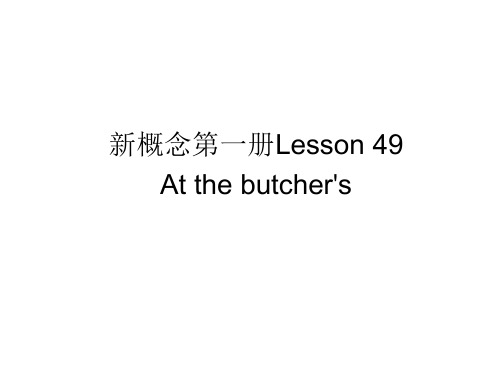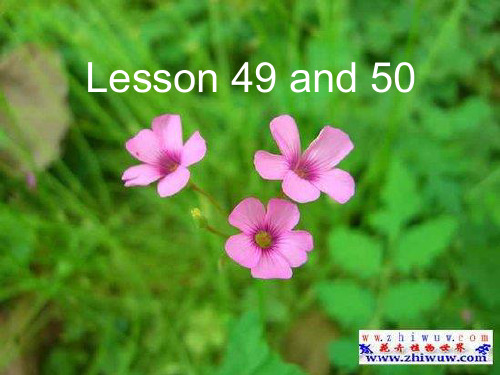新概念第一册自学导读Lessons49-50
- 格式:docx
- 大小:9.24 KB
- 文档页数:5






2016新概念第一册-L e s s o n-49-50-课堂及课后练习新概念一 Lesson49课内语法一、单词:拼读,过关,讲解1.butter - n 卖肉的。
at the butcher's (shop) 在肉店2.meat - n (食用)肉,(不可数)。
指供食用各种动物的肉,但不包含fish eg: Do you want any meat?您要买点肉吗?3.beef - n,牛肉(不可数)roast beef.烤牛肉mb - n 羔羊肉(不可数)。
eg:Do you want beef or lamb?您要牛肉还是羔羊肉?5.husband - n 丈夫- husgands (复)。
对应词:wife - n 妻子-wives eg: My husband doesn't like lamb.我丈夫不喜欢羔羊肉。
6.steak - n 牛排。
(不可数)。
raw steak 生牛排。
well-done steak煎牛排。
eg: What about some steak?牛排呢?7.mice - n 肉馅;绞肉(不可数) eg:a pound of mince 一磅肉馅8.chicken - n 鸡(可数),鸡肉(不可数)。
eg:I have two chickens,but I don't like to eat chicken.eg: Do you want a chicken? 您要只鸡吗?9.tell - v 告诉。
短语:tell a lie=tell lies 说谎。
tell stories讲故事。
tell sb. sth=tell sth.to sb.10.truth - n 实情;真相。
tell the truth说实话。
find out the truth查出真相。
to tell (you) the truth(用于句首),说老实话11.either -adv也。
新概念第一册自学导读Lessons49-50 课文详注Further notes on the text1.What about some steak? 来点牛排吗?句中What能够换成How用来征求对方看法或意见。
请参看Lesso ns 31〜32课文详注。
2.to tell(you) the truth, 老实说,说实话。
它常用于句首,作句子的附加成分,表示说话人对所说话语的态度:To tell you the truth, I don't like his new car at all. 给你讲实话,我一点儿也不喜欢他的那辆新车。
3.序数词13th 〜24th13th thirteenth 14th ------ f ourteenth 15th --- fifteenth16th --- sixteenth 17th --- s eventeenth 18th --- eighteenth19th nineteenth 20th ------ t wentieth 21st --- twenty-first22nd -- twenty-second23rd --- twenty-third24th --- twenty-fourth语法Grammar in use1 .选择疑问句含有or 的问句称为选择疑问句。
or 之前的部分读升调,之后的部分读降调。
这种疑问句不能简单地用Yes或No来回答。
选择疑问句把选择的余地缩小在数目有限的事物、行动等上面,能够有无限性的选择、3项选择以及两项选择。
选择疑问句通常能够采用缩略形式,如:Beef or lamb? 牛肉还是羔羊肉?选择疑问句的例句如:What would you like to drink? 你喜欢喝什么?(无限性选择)Which/What would you prefer, tea or coffee? 茶和咖啡,你喜欢哪一种?(两项选择)Would you like tea, coffee, or milk? 你喜欢茶、咖啡、还是牛奶?(3 项选择)How shall we go, by bus or by train? 我们怎么走?乘公共汽车还是坐火车?Did you go there, or didn't you? 你去了那儿还是没有去?Did you or didn't you go there? 你是去了还是没有去那儿?2.一般现在时的单数第 3 人称形式(可参见Lessons 47 ~ 48语法部分。
新概念第一册自学导读Lessons49-50 课文详注Further notes on the text
1.What about some steak? 来点牛排吗?
句中What能够换成How用来征求对方看法或意见。
请参看Lessons 31 〜32 课文详注。
2.to tell(you) the truth,
老实说,说实话。
它常用于句首,作句子的附加成分,表示说话人对所说话语的态度:
To tell you the truth, I don't like his new car at all.
给你讲实话,我一点儿也不喜欢他的那辆新车。
3.序数词13th〜24th
13th -- thirteenth 14th fourteenth 15th - fifteenth
16th -- sixteenth 17th - s eventeenth 18th -- eighteenth
19th -- nineteenth 20th - twentieth 21st twenty-first
22nd -- twenty-second
23rd -- twenty-third
24th -- twenty-fourth
语法Grammar in use
1.选择疑问句
含有or 的问句称为选择疑问句。
or 之前的部分读升调,之后的部
分读降调。
这种疑问句不能简单地用Yes或No来回答。
选择疑问句把
选择的余地缩小在数目有限的事物、行动等上面,能够有无限性的选择、3 项选择以及两项选择。
选择疑问句通常能够采用缩略形式,如:
Beef or lamb?
牛肉还是羔羊肉?
选择疑问句的例句如:
What would you like to drink?
你喜欢喝什么?(无限性选择)
Which/What would you prefer, tea or coffee?
茶和咖啡,你喜欢哪一种?(两项选择)
Would you like tea, coffee, or milk?
你喜欢茶、咖啡、还是牛奶?(3 项选择)
How shall we go, by bus or by train?
我们怎么走?乘公共汽车还是坐火车?
Did you go there, or didn't you?
你去了那儿还是没有去?
Did you or didn't you go there?
你是去了还是没有去那儿?
2.一般现在时的单数第3 人称形式
(可参见Lessons 47 —48语法部分。
)
词汇学习Word study
1.too adv.
也,还(常用于肯定句,有时也用于疑问句,但不能用于否定句。
常见于句末,而且too 前常有逗号;如果不在句末,too 前后都理应有逗号):
I like lamb, too.
我也喜欢小羊肉。
Can I come, too?
我也来,行吗?
I, too, have been to Shanghai.
我也到过上海。
2.either adv.
也,而且(一般用于否定句,位于句末,前面通常有逗号):
He doesn't like the house, and I don't like it, either.
他不喜欢这所房子,我也不喜欢。
If you do not go, I shall not go, either.
如果你不去,那么我也不去。
I haven't seen the film and my sister hasn't either.
我没有看过那部电影,我妹妹也没看过。
练习答案Key to written exercises
Lesson 50
1 He likes coffee, but I don't.
2She likes tea, but he doesn't.
3He is eating some bread, but she isn't.
4She can type very well, but he can't.
5They are working hard, but we aren't.
6He is reading a magazine, but I am not.
1 Yes, he does.
He likes cabbage, but he doesn't want any. 2Yes, he does.
He likes lettuce, but he doesn't want any. 3Yes, I do.
I like peas, but I don't want any.
4Yes, she does.
She likes beans, but she doesn't want any. 5Yes, I do.
I like bananas, but I don't want any.
6Yes, he does.
He likes oranges, but he doesn't want any. 7Yes, he does.
He likes apples, but he doesn't want any. 8Yes, she does.
She likes pears, but she doesn't want any. 9Yes, I do.
I like grapes, but I don't want any.
10Yes, she does.
She likes peaches, but she doesn't want any.。